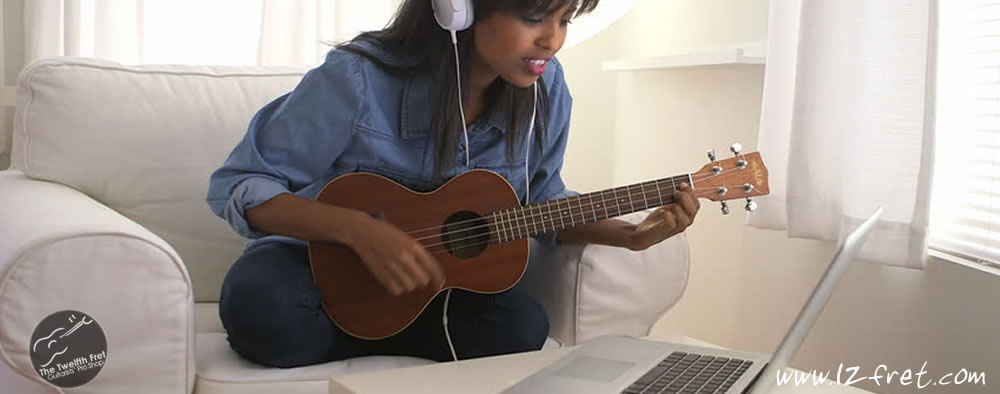
Practicing, The Internet and 100 Conflicting Opinions
My students will frequently ask me what my thoughts are on various online articles they may have come across. It might be a specific video tutorial, maybe a how to hold your hands article or a how to structure your practicing time column. There is a lot of information out there, much of it conflicting and a lot of it in my opinion misses the mark, in some cases by miles.
I remember in one case a student was asking about a specific article on how to structure your practicing and how most people do it incorrectly. The article insisted that 15 minute chunks were the way to go with the 15 minutes broken down into things like 2/ 1/2 minutes on scales 3 minutes on right hand technique, 2 minutes on finger placement etc. etc. etc. My favorite part though was after the 15 minute chunk of practicing there were breathing exercises, a few yoga stretches and I think some kind of soy sandwich for the brain.
There is nothing wrong with any of the above suggestions, with the possible exception of the soy sandwich, but it raises the question: Is there a best way to practice? There is certainly no shortage of articles like the one I was shown above arguing yes, do this, or do that, but what do you do when after reading 4 or 5 articles you realize you’re getting inconsistent or even conflicting information?
I never broke my practicing into 20 minute chunks and I certainly never had a formal 2 minutes of this followed by 2 minutes of that regime. In fact, I never even distinguished in my own head when I was “practicing” vs “playing” vs “farting around”. I still don’t. That isn’t to say there is anything wrong with the structured approach the article in question was outlining, it’s a fine approach. The problem with that article was it’s insistence that this is how you should do it and anything else is less effective and not as an efficient use of time. Wrong.
When I read articles online about guitar playing I think to myself: Is all the other stuff I read online, that I don’t intimately know as well as music, this confused? When I was learning to play there was no internet so I didn’t have to deal with online opinions and tutorials. There were still issues though. I remember learning the Rain Song by Led Zeppelin from an “official” book I picked up when I was first learning back around 1979. It sounded a bit off but who was I to question the official transcription? I figured it sounded wrong because I wasn’t very good. Then I saw the live Led zeppelin film that had the camera on Jimmy Page during the Rain Song……I threw the book out (lots of other stuff in it was off too). As most people know now, Jimmy tuned his guitar differently for that song and it’s pretty easy once you get that part correct, but in standard tuning the song is an inaccurate nightmare and I was learning the nightmare version for a mere $25.99.
When I read articles online about guitar playing I think to myself: Is all the other stuff I read online, that I don’t intimately know as well as music, this confused? When I was learning to play there was no internet so I didn’t have to deal with online opinions and tutorials. There were still issues though.
When it comes to practicing and information it’s fine, even helpful, to read different things online as long as you remember to take it all with a grain of salt and be very wary of anyone who seems insistent that their way is the only way, or even the best way. It isn’t. There is no “only” and there is no “best”.
Rigid structure works well for some while less formal approaches work best for others. It’s so important to remember that when you’re practicing it isn’t really what you are doing specifically that is making the difference, it’s the time you’re putting in. Your brain is rewiring itself every minute you are engaged and playing and it needs hundreds, if not thousands of hours to complete that task.
If that sounds daunting, this would be a good time to remind you of something you already know. If learning an instrument was fast and easy, everybody would be doing it. Everybody wishes they could play one instrument or another, and for some, not being able to play music becomes a lifelong regret.
So it doesn’t matter so much whether you are practicing your pentatonic scales in all positions, or whether you are learning as many chord voicings as possible, or whether you are learning a series of your favorite songs. What matters is that you are spending time with the guitar, mentally engaged in what you are doing and always pushing forward in the direction you want to go. If rigid formal practice structure accomplishes that best for you, then do that. If less formal more creative approaches accomplishes that best, then do that. It’s the time that matters most, just about everything else will sort itself out.
If learning an instrument was fast and easy, everybody would be doing it. Everybody wishes they could play one instrument or another, and for some, not being able to play music becomes a lifelong regret.
It’s also important to watch out for ruts. It’s easy to fall into ruts when you are a musician. Ruts are those times when you feel like you aren’t getting better, you’re bored with what you are playing and your enthusiasm is suffering as a result. If you’re in a rut, you probably need to challenge yourself with something new and make the time to meet that challenge. Just ask yourself, what song, piece, or technique is there that you can’t do, or don’t know but have always really liked and wanted to be able to do. You might decide some lessons in a particular technique are what you want or maybe you’re finally going to tackle that one specific song where you know what to do but you always thought it was too hard.
Here’s a funny story. When I was at Berklee, a guitar instructor handed out a questionnaire to the class on the first day. It had a series of questions like: Do you lose track of time when you practice? Has playing the guitar impacted any of your personal relationships? When you’re not playing, do you find yourself frequently thinking about playing? If you haven’t guessed it yet, what he had done was taken a clinically respected questionnaire used to determine alcoholism and changed all the references to music. Yep, everyone in the class was a “guitar-aholic” literally, clinically.
The only thing that all good guitar players have in common is that they all have sunk a lot of time into the guitar. Everything else varies. It isn’t so much about doing this or that in your 15 minutes of playing/practicing as it is about turning that 15 minutes into an – enjoyable, productive hour!
~David Martin, The Twelfth Fret Music School
